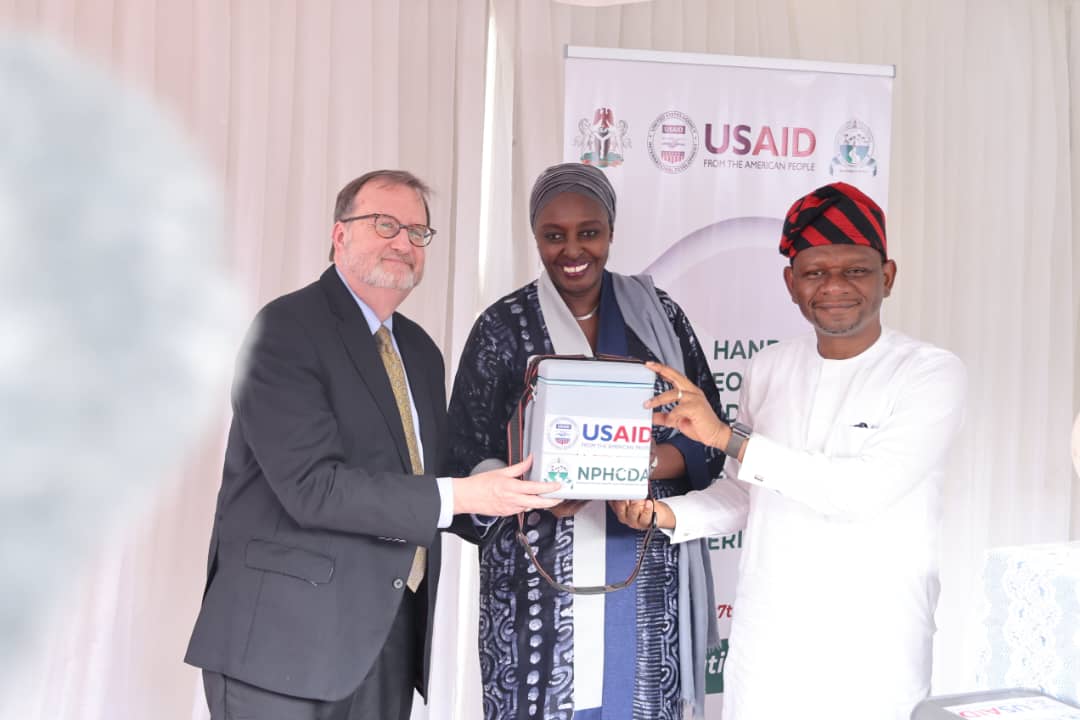On Tuesday, the United States Government donated 10,000 doses of the Jynneos vaccine to Nigeria to aid the Federal Government in controlling the spread of mpox within the country.
The Jynneos vaccine is approved by the Food and Drug Administration (FDA) for the prevention of smallpox and mpox in adults aged 18 and older who are at risk of infection.
During the official handover ceremony in Abuja, Coordinating Minister of Health and Social Welfare, Prof. Muhammad Pate, expressed gratitude to the U.S. government for the donation, emphasizing the Nigerian government’s commitment to enhancing public health.
Represented by the ministry’s Permanent Secretary, Daju Kachollom, Pate stated, “This is a spirit of cooperation and collaboration that has endured over the years. This vaccine will greatly assist us. The Federal Ministry of Health recognizes the importance of a healthy nation, and our policies and collaborations focus on ensuring the health of our citizens.”
He praised the leadership of both the Coordinating Minister and Dr. Tunji Alausa, Minister of State for Health, highlighting their efforts to transform the health sector. “Thank you for the 10,000 doses. We look forward to receiving more. I also want to acknowledge our development partners, including USAID, PEPFAR, WHO, and UNICEF, for their collaboration, which will significantly benefit those in need.”
Mpox is a rare viral zoonotic disease transmitted from animals to humans, primarily occurring in remote villages of Central and West Africa near tropical rainforests. It is caused by the mpox virus, a member of the Orthopoxvirus genus, which also includes the variola virus (responsible for smallpox) and the vaccinia virus (used in smallpox vaccines). Following the eradication of smallpox, mpox has emerged as the most significant Orthopoxvirus.
On August 13, 2024, the Africa Centres for Disease Control and Prevention declared mpox a public health emergency of continental security to address this significant health threat.
As of last Friday, the Nigeria Centre for Disease Control and Prevention reported a total of 40 confirmed mpox cases out of 830 suspected cases nationwide.
U.S. Ambassador to Nigeria, Richard Mills, emphasized that health is a top priority for the U.S. Embassy. “I’m very pleased to be here today for the handover of 10,000 doses of mpox vaccines donated by the U.S. government through USAID. These vaccines will support the Nigerian government’s response to the current mpox outbreak, which has been declared a global emergency by the World Health Organization.”
Mills noted the interconnectedness of public health threats worldwide, stating, “A public health threat in one place is a threat for all of us. That’s why we prioritize support for global health security, especially in vulnerable countries.”
He commended the Nigerian government for developing a national mpox vaccination strategy and development plan, reiterating the U.S. government’s commitment to partnering with Nigeria in strengthening public health systems.
Dr. Muyi Aina, Executive Director of the National Primary Health Care Development Agency, described the vaccine donation as a vital step in Nigeria’s preparedness against mpox. He highlighted the WHO’s declaration as a public health emergency, stressing the need for countries to take it seriously and implement effective plans to protect their populations.
“This handover ceremony symbolizes not just the transfer of vaccines but also our international cooperation in addressing both global and local health challenges,” Dr. Aina remarked. “We are immensely grateful to the U.S. government for this gesture of solidarity, especially given the limited supply of this vaccine globally.”
Dr. Aina assured that the NPHCDA is committed to the efficient use of the vaccines, prioritizing the most affected states and vulnerable populations, including healthcare workers and contacts of confirmed cases. He also emphasized that vaccination is only one aspect of the response strategy and pledged ongoing collaboration with the NCDC to enhance surveillance and public awareness campaigns about mpox.
“This fight requires collective action,” he added, urging all partners, including UNICEF, USAID, and USCDC, to unite in the effort against this virus.




